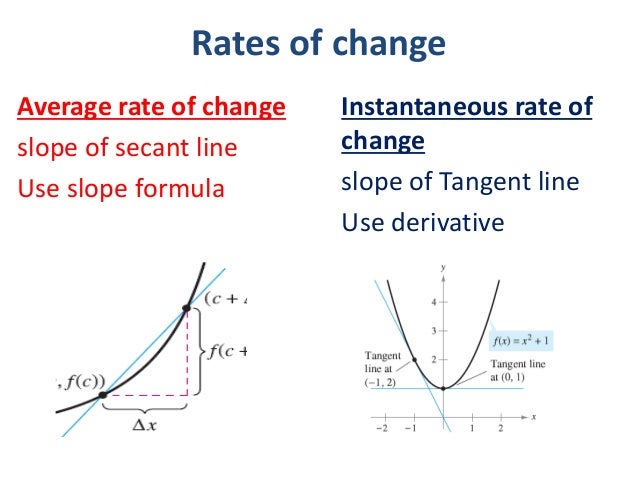SCR > 2.01 Average and Instantaneous Rates of Change
|
The calculator will find the average rate of change of the given function on the given interval, with steps shown.

- In general, you can skip the multiplication sign, so `5x` is equivalent to `5*x`.
- In general, you can skip parentheses, but be very careful: e^3x is `e^3x`, and e^(3x) is `e^(3x)`.
- Also, be careful when you write fractions: 1/x^2 ln(x) is `1/x^2 ln(x)`, and 1/(x^2 ln(x)) is `1/(x^2 ln(x))`.
- If you skip parentheses or a multiplication sign, type at least a whitespace, i.e. write sin x (or even better sin(x)) instead of sinx.
- Sometimes I see expressions like tan^2xsec^3x: this will be parsed as `tan^(2*3)(x sec(x))`. To get `tan^2(x)sec^3(x)`, use parentheses: tan^2(x)sec^3(x).
- Similarly, tanxsec^3x will be parsed as `tan(xsec^3(x))`. To get `tan(x)sec^3(x)`, use parentheses: tan(x)sec^3(x).
- From the table below, you can notice that sech is not supported, but you can still enter it using the identity `sech(x)=1/cosh(x)`.
- If you get an error, double-check your expression, add parentheses and multiplication signs where needed, and consult the table below.
- All suggestions and improvements are welcome. Please leave them in comments.

Problems involving Limits and Average Rates. From the text on Page 66: 2, 8, 20, 40. Precalculus: Mathematics for Calculus, 7th Edition answers to Chapter 2 - Section 2.4 - Average Rate of Change of a Function - 2.4 Exercises - Page 188 17 including work step by step written by community members like you.
The following table contains the supported operations and functions:

2.1 Average Rate Of Changeap Calculus Calculator
| Type | Get |
| Constants | |
| e | e |
| pi | `pi` |
| i | i (imaginary unit) |
| Operations | |
| a+b | a+b |
| a-b | a-b |
| a*b | `a*b` |
| a^b, a**b | `a^b` |
| sqrt(x), x^(1/2) | `sqrt(x)` |
| cbrt(x), x^(1/3) | `root(3)(x)` |
| root(x,n), x^(1/n) | `root(n)(x)` |
| x^(a/b) | `x^(a/b)` |
| x^a^b | `x^(a^b)` |
| abs(x) | `|x|` |
| Functions | |
| e^x | `e^x` |
| ln(x), log(x) | ln(x) |
| ln(x)/ln(a) | `log_a(x)` |
| Trigonometric Functions | |
| sin(x) | sin(x) |
| cos(x) | cos(x) |
| tan(x) | tan(x), tg(x) |
| cot(x) | cot(x), ctg(x) |
| sec(x) | sec(x) |
| csc(x) | csc(x), cosec(x) |
| Inverse Trigonometric Functions | |
| asin(x), arcsin(x), sin^-1(x) | asin(x) |
| acos(x), arccos(x), cos^-1(x) | acos(x) |
| atan(x), arctan(x), tan^-1(x) | atan(x) |
| acot(x), arccot(x), cot^-1(x) | acot(x) |
| asec(x), arcsec(x), sec^-1(x) | asec(x) |
| acsc(x), arccsc(x), csc^-1(x) | acsc(x) |
| Hyperbolic Functions | |
| sinh(x) | sinh(x) |
| cosh(x) | cosh(x) |
| tanh(x) | tanh(x) |
| coth(x) | coth(x) |
| 1/cosh(x) | sech(x) |
| 1/sinh(x) | csch(x) |
| Inverse Hyperbolic Functions | |
| asinh(x), arcsinh(x), sinh^-1(x) | asinh(x) |
| acosh(x), arccosh(x), cosh^-1(x) | acosh(x) |
| atanh(x), arctanh(x), tanh^-1(x) | atanh(x) |
| acoth(x), arccoth(x), cot^-1(x) | acoth(x) |
| acosh(1/x) | asech(x) |
| asinh(1/x) | acsch(x) |
